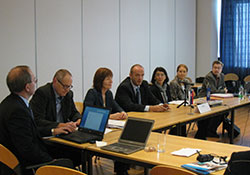Monitoring mechanisms for preventing health care related adverse events

WHO/Jana Potuckova
Experts shared results of the research conducted in hospitals using the WHO methodology for measuring and preventing health care related harm and efficiency of alert mechanisms. They reported on status of planned interventions one year after inception (workshop in Ljubljana, October 2010) including focus on health promotion, patient safety engagement and health literacy at various levels of health service delivery. They stressed the need to enhance patient and consumer involvement and consolidate multi-stakeholder approaches for patient safety at local, national and regional levels.
The workshop was one of the tasks implemented within the framework of biennial collaborative agreements in the three countries. Highly professional technical support was provided by WHO headquarters, WHO Regional Office for Europe and WHO temporary advisors.
All participants acknowledged the need to increase the learning about how interventions really add value in terms of changing culture, practices, processes and regulatory frameworks to improve patient safety. It is a known fact that 10% of hospital admissions still incur some kind of serious harm and that over 50% of these are preventable. Patient safety can raise concerns also outside the hospital setting, in general practice, pharmacies and the community. The cost of serious safety errors is counted both in human suffering for patients, their families and health professionals as well as the financial costs incurred to health care.
They all expressed willingness to continue to collaborate in this important area next biennium and would welcome also participation of other countries from the Region.



